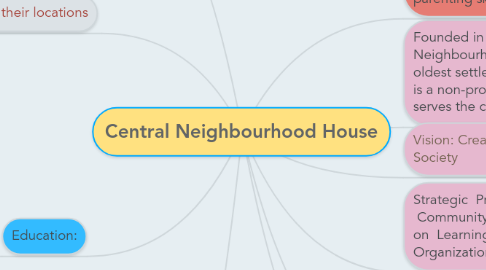Central Neighbourhood House
by christine s

1. Programs:
1.1. Youth initiative program: youth take the initiative in designing programs throughout the year – weekend recreation is open to everyone, in addition to organized activities like ping pong, cooking, board games, open discussion and life-skills development. The program preparation and development provides an opportunity for leadership skills training and growth, and instills a sense of ownership of the space and the programs. Staff also provide individual career mentoring and employment readiness preparation.
1.2. The CNH Boyz 2 Men Club, for those 13 – 16, gives young men an opportunity to explore interests and new activities that they might not otherwise try. Career mentoring is an important component of the program: staff meet with participants one-on-one to develop and complete their action plans. The young men learn how to set smart goals, manage their time effectively, create action plans, and explore the careers that appealed to them and then the paths they should take to get there. Staff supported, encouraged and nurtured them in the process
2. Education:
2.1. In 2013 The principles of Early Learning for Every Child Today (ELECT) have now been translated to new childcare criteria, and our eight full-time Registered Early Childhood Educators and six full-time Early Childhood Education Assistants embarked on a journey of professional training and development to meet and exceed standards of quality and care.
2.2. Staff take pride in delivering a multicultural curriculum that provides opportunities to explore, investigate and experiment. Through ongoing observations, documentations and evaluations, staff are able to provide enriching experiences that inspire learning and promote optimal development for each child. By respecting children as active participants in their learning environment, we offer the very best educational experiences through our play-based approach.
2.3. CNH educators, through their partnerships with parents, provide a program that encourages the sharing of culture, language and life experience of our community. This is reflected in our daily program, and even in the diverse menu prepared by our in-house chef.
3. Tutoring: CNH has a long tradition of providing educational support, from early English language tutoring to the Extra Push program of the 50s and 60s. We have always understood that to be successful in school, students and their parents need access to resources and supports outside of the classroom during after-school hours.
3.1. The Tutoring Program strives to fill this need, making sure support and supplies are readily available and that each student has a fair chance to achieve academic success. We partner volunteer tutors with children and youth in need of homework help and academic support. In a one-on-one setting, tutors and learners meet on a weekly basis and dedicate one to two hours to academic pursuits.
4. Services are accessible at any of their locations
5. Founded in 1911, Central Neighbourhood House is the second oldest settlement house in Toronto. It is a non-profit organisation that serves the community.
6. Vision: Creating A Just and Caring Society
7. Mission: To engage the skills and talents of the people of our community, to foster social justice and to build a vibrant neighbourhood where everyone lives with dignity and respect
8. Strategic Priorities: Community Engagement, A Focus on Learning and Knowledge, Organizational Resilience
9. Values: Diversity, Empowerment, Leadership, Inclusivity
10. Family Support: The Family Support Program advocates for families and provides a series of education sessions and programs for parents, to help them deal with their children‘s special needs and develop their parenting skills.
10.1. A staff of CNH accompanies families to court, doctor‘s and lawyer‘s appointments, immigration and welfare offices as well as meetings with child protection workers.
10.2. When they advocate strongly on their behalf with community agencies and government departments, parents are able to move forward and concentrate on what their children need.


